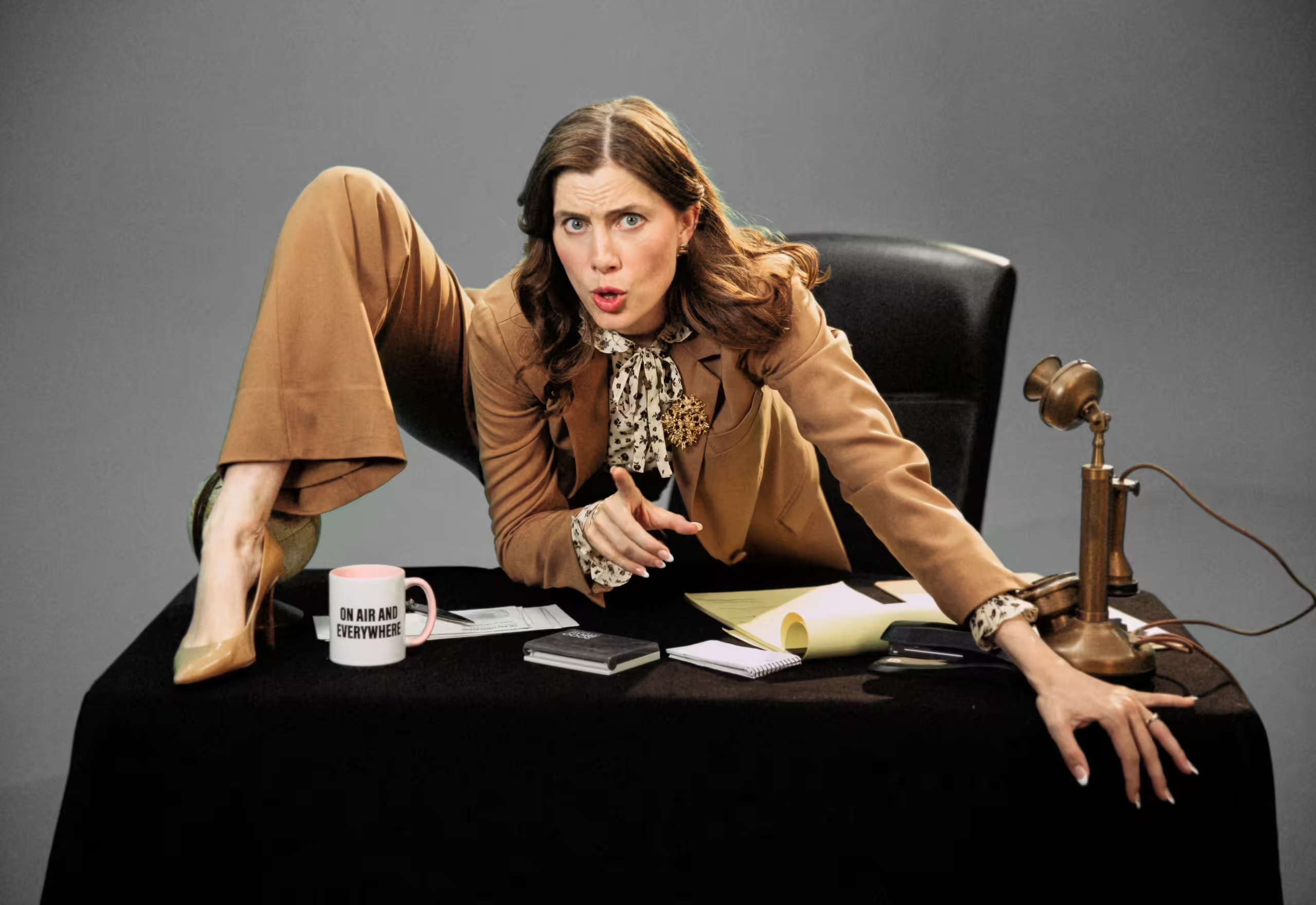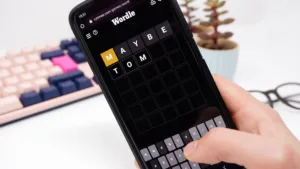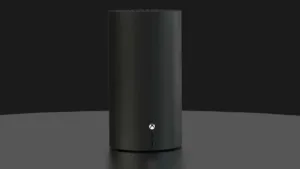Dropout’s Vic Michaelis on Very Important People season 2 and the meaning of life

According to Vic Michaelis (host of Dropout TV’s improvised comedy series Very Important People), the key to their character (the fictional Vic Michaelis, host of the very serious and very fictional public access TV show Very Important People) is giving off the vibe that “this is the most important show in the world because I am hosting it.”
They immediately emphasized: “Not me; my character, obviously. I wouldn’t say that about myself, I promise.”
Based on — and expanding from — the CollegeHumor series Hello, My Name Is, every episode of Very Important People features a new guest comedian who is given a secretive and extreme makeover courtesy of Dropout’s makeup, hair, and wardrobe staff. Then, they have a spare few minutes to take in their new look, create a character based on it, and sit down with Michaelis (in character as “Host Vic”) for an improvised interview.
Very Important People was a standout among Dropout’s strong lineup of 2024 programming, even winning a People’s Voice Webby Award in the video comedy category. The strange guests of Very Important People — a caveman/physicist, an adult child pageant queen, a bodybuilder who found $100,000 in a bag in the park, invested it, and turned it into $16,000 — certainly grab attention. But it’s just as obvious that Michaelis’ talent as a scene partner, and their grip on the character of “Host Vic,” is the tetherball pole that makes those wild swings possible.
With season 2 of Very Important People premiering on Dropout today, Polygon sat down with Michaelis over Zoom to discuss what’s new in the new season, how to give Public Access Television Host, and whether or not this is the interview where people find out that they’re a monster.
Polygon: You’ve created this show around you interviewing people in these wild costumes. Are you ever jealous that you don’t get to dress up, that you’re missing out on that side of the experience?
Vic Michaelis: Oh, great question, and the answer is absolutely not. [laughs] I am sitting comfortably in a chair which I designed for myself. I had an improv teacher who’s named Alex Fernie who really changed my world when it comes to improv stuff. He always says that a “voice of reason” character, which is the characters that I like to play, and which I would argue is more of Host Vic — in an improv setting you’ve got an unusual character and then the voice of reason who speaks to how the audience is seeing a character. And I think voice-of-reason characters are often viewed as boring, and the ones that are doing the boring job in an improv scene, and then the unusual character gets to have fun. They’re all of the classic characters that you think of when you watch SNL or Comedy Bang Bang, or whatever.
But this teacher, Alex Fernie, was sort of like: No, the voice of reason has a very full life that they’re living and they have unusual traits about them, it’s just in this situation, with this person that they’re talking to, that they’re the voice of reason. And I have used that to jump off of this host character who has all of these quirks and eccentricities, and then over the course of these episodes gets to show those off, but at the same time gets to be the one that’s grilling these unusual characters and helping build out their unusual thing. It’s like “gift giving,” which is my favorite thing to do in improv.
Obviously at least some of the “Host Vic” persona came out in the improv, but was any of it planned ahead of time?
Almost none. We have a loose arc for the host; Tamar Levine, the director, and I sit down and are sort of like, OK, what do we think is going to happen this season? Where would we like to theoretically end up? So we mapped that out a little bit, but then the eccentricities and the little things, how we feel about the crew and the cast, usually comes out through the improv on the day and the gifts that I’m given from the other improvisers that are playing these unusual characters coming in, which is really, really cool. It’s very fun! [laughs]
What is the secret to giving Public Access Television Interviewer?
Oh man. I can’t speak to the public access TV journalist community, personally. But I will say I feel confident in saying I have probably, as a viewer — as somebody that is not working for public access television, I’ll give it that caveat — I have probably logged more hours watching public access news programs than I think maybe anybody else… in the world? Is that bold of me to say? I said it. So it’s out there now.

But I think that there is a little bit of an edge to ownership and feeling very comfortable. Something that I took from a lot of these public access cable shows is just a real importance — [sighs ruefully] ugh, “importance,” [singsong] Very Important People — importance to what they’re doing. And that was something that I really wanted to bring into this. This is the most important show in the world because I am hosting it — not me, my character, obviously. I wouldn’t say that about myself, I promise. [pretending to panic] We’re blurring lines! Here we go! [normal again] What if this is the interview where people find out I’m just a monster? Can you imagine?
God, the responsibility that would put on me.
Yeah, I’m breaking this story with Polygon, exclusively: Vic is a monster. And I feel good about that, actually.
Thank you so much.
If I’m going to break it somewhere, I want it to be Polygon, so thank you for being here.
We really appreciate it.
What was the question again?
What’s the secret to giving Public Access Television Interviewer?
Right, of course. Yeah, I just like characters in general who think they’re a high-status character, but are actually a very low-status character. Host Vic has no means, Host Vic has no access, but thinks that they are too good for the situation that they’re in and are meant for greater and bigger things, even though they absolutely are not.
When thinking about this idea, of having all of these different characters come in from different places, Tamar and I talked a lot about why this host character would be so interested in these interviews going well, and that was the answer for us. This host character is interested in these interviews going well because they want to be on CNBC; they have these great big aspirations and if this goes well, maybe that is a possibility for them. I think there is a little tinge of that in a lot of these public access shows, and they’re great and they’re run by a lot of people that are trying to talk to their communities, which is wonderful. But in this instance, there is always just a little bit of a tinge of This show is important, and so we wanted to make sure we captured that.

What’s the most important thing that you or production learned from season 1 that you’ve brought into season 2?
We know what the edits look like, which is huge — which is massive! I think one of the beautiful things about working at Dropout is they really feed creativity. We came with a lot of these big ideas and they said, “Let’s see what it looks like.” They really gave us rein to do a lot of things, but, because of that, we tried a lot of things. Some of it got used in the edit, some of it didn’t, but we had all of it and had access to all of it, which was really beautiful and amazing. Some things that we never could have expected the way that they were going to turn out ended up being really integral to the show that people are interacting with now.
So coming into this season, as we were shooting, we knew what the edits were going to look like — we had a much better idea of what the show was going to feel like. Because this show was based off of an old formerly-known-as-CollegeHumor series called Hello, My Name Is that was created by Josh Ruben and Pat Cassels — this is sort of a spiritual sequel to that. But in that show, Pat was interviewing Josh Ruben in hair and makeup, as himself, and those episodes were like five to seven minutes long. That was the only sort of blueprint that we had, [and Very Important People] is very different from that. But yeah, this season we just know what the edits are going to look like. The shooting was much more economical because we knew what our end goal was, if that makes any sense.
Do you have a favorite thing in season 1 that didn’t make it into the edit?
Oh man. What a great question. I think a lot of the stuff that I was like, Oh, I really love that made it into, at the very least, the bloopers episode. I mean, basically everything Izzy [Roland] said; Izzy played Leighanna-Jean Gruthers, who was a pageant queen. And I mean, me as the character and me as myself just immediately fell in love with [Roland’s character], and then her character wanted absolutely nothing to do with me. It just really tickled me. Everything that character said, a bunch of it got — most of it played [in the episode] and then a bunch of it played in the bloopers. So I’m really grateful. Anything that missed [making it into an episode]… I mean, I just laughed a lot. I laughed an awful lot during every single episode. A lot of that didn’t play, and I don’t know how interesting it would be just to watch me laugh for three hours, but [laughs].
I have a related question to that, which is: Which guest made you break the most?
[immediately] Zac [Oyama].

We did see a lot of that in the edit!
And I would say that got pared down as much as humanly possible. There was absolutely no way to cut around that. I’m usually pretty good at — I do improv five nights a week, you know what I mean? I’m performing live. I see a lot of improv. Zac is somebody, maybe across the board, that I don’t know what it is about his delivery and his style — nobody makes me laugh the way Zac and Ally Beardsley do. Those two people can — I don’t know what it is. They hit me in a place where I crumble. I was going to say like a tower of cookies, but that doesn’t feel right.
I can see it, though. It’s a good visual.
Thank you, I appreciate you saying that.
What’s the push-pull on cutting around actors breaking, or leaving the breaking in because it’s genuinely funny? Is it case by case or do you have a philosophy behind it?
Tamar, our director, and Eve [Hinz], our editor, would definitely be the people to ask that question to. The show really exists in three parts: live on the day, in the editing and what that editing process looks like, and then how people interact with it once it’s out and about. I’m not totally sure what [our philosophy is], but I know in our conversations keeping the tone of the show is really important. We don’t want the whole thing to be laughter because we still want to keep it within the reality of this news show that we’ve built. But also too, I don’t know, the reality is that a lot of it is making me laugh very hard and is making the people on set laugh really hard. And so it is nice when it’s applicable — and also when we just simply cannot cut around it, to just show that happening.
Did you make any changes to the format? Obviously there’s a new minigame this first episode, but there can be changes in front of the screen or behind the scenes.
The show is bigger in every capacity. We had some more ambitious makeup, we had more episodes, more cast, and so we were physically spread out more across the studio. In terms of change to format, we sat down and watched a ton of late-night [TV], we watched a ton of interviews and tried to come up with our spin on a lot of the games that they’ll play in those instances. Our thought process overall this season was: We physically won a Webby, a People’s Choice Webby, in between seasons, and so that becomes a big player this season.
It’s this idea that this host character that thinks that they’re too good for this show finally is getting some of the success that they wanted in a way they absolutely did not want it, and so now feels shackled to this show that they don’t really want to be a part of, because it’s not this huge news thing that they wanted to be doing. So we are adding in some more of these games to try and keep the “attention” of this audience. It’s now this host character desperate to keep the little bit of attention that they’re getting for this thing that they’re doing, while also getting some career opportunities, potentially, to get them out of this position. We added some different segments to things like that.
Purely from our point of view, we now know what camera capabilities are. What was so cool about this season is this is an improvised show, top to bottom. We are improvising on stage, the creative team is improvising in real time to be like, Oh, can we fly props in? What can we send in? The camera department’s like, Oh, what if we did this shot here? They’re doing this, so why don’t we try and run there? We have a Steadicam this season, which is maybe just boring and logistical for people that don’t work on sets. Every department really stepped up and was like, How can I also be improvising in this moment to help support the improv that’s happening onstage? Which was very, very cool. There’s a lot more of that this season and an episode that I think really showcases that is Paul Robalino’s, who’s a producer on the show, and he knew what was capable with a lot of the elements of stuff like this, and so he really went absolutely wild with that in a way that is very, very fun.
Do you get to see the character designs before day of shoot?
Yeah! I like to think of myself as the representative of the improv coalition, because obviously I’m the only person that’s physically improvising and everybody else can’t know what the characters are. So I get to come in and be like, Oh, I think this would be difficult for improv because the only way to play this is going to be some sort of a deceit, and deceit is hard to play in improv.
Or: This, logistically, means that the character is not going to be able to move or not going to be able to stand up, so we just want to make sure that we have a little bit more movement in this area. Or: Oh, I know this person can do a backflip, and so maybe we put this person in this costume, and then if they wanted to, if it comes to that they have the ability to do some movement. With me knowing a lot of the cast, I get to help pair people with that, which is very exciting.
It is a suggestion, I think. I really think knowing what the characters are beforehand doesn’t give me any clue into what people are going to choose for their characters. Last season I would’ve had absolutely no idea — even knowing that Zac was a bodybuilder, what type of person he was going to be or what that was going to look like, I literally could not have told you. Brennan’s caveman one, where he’s a dream? We found that in the middle of shooting. There’s absolutely no way to know that that was what was going to happen. It is constantly changing; it is always a surprise until the second they call cut.

Well, I’m at the end of my time, so I’m just going to close by asking you: How many people in this press day so far have asked you what the meaning of life is?
Oh, none! Ooh!
Would you like to answer?
Yes! What is the meaning of life…
The meaning of life is — I mean, this is silly, but it’s genuine: I really think it’s bearing witness to the people around you. I think it’s getting to share and receive even the day-to-day of what people are doing and how they’re existing. I think it’s the greatest thing that you can do. It’s always easy to be there for the big things, but just to get to see the quiet moments really is all of it, I think.










